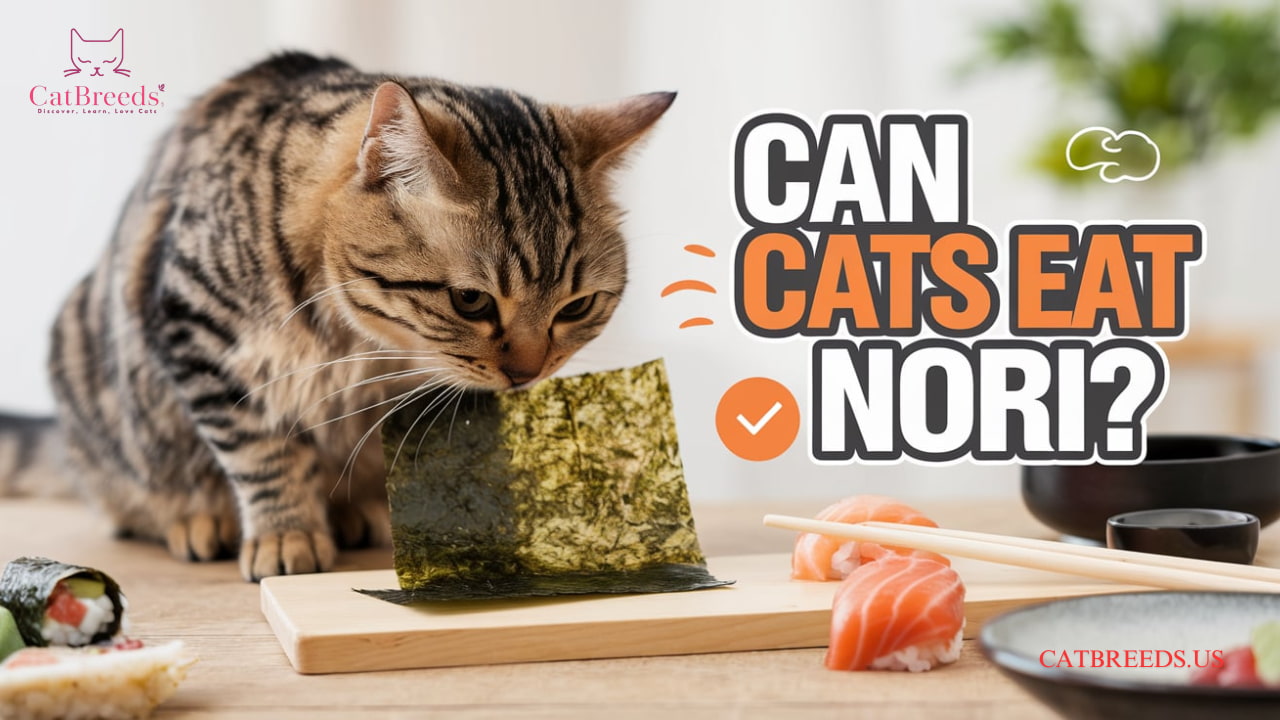Have you ever thought of a seaweed sheet wrapped around that Can Cats Eat Nori? Well, while pet owners are dabbling into more innovative and exciting recipes for their cats, nori has caught many’s attention. But is this savory seaweed popular in Japanese cuisine safe for our whiskered companions?
What is Nori?

In Japan, the edible Seaweed Nori is likely attached to the most prominent form of seaweed. Those dark green, skinny, almost wooden sheets used to wrap the sushi in or even sprinkled on top of almost every dish? Ah Nori! It is a name given to the processed and dried thin sheets made from a particular kind of edible red seaweed.
Seaweed Nori has recently crossed the geographic boundaries and begun appealing to Western diets for its health and taste factors. No wonder health freaks would find it hard to resist this food, looking high in vitamins, mineral elements, and antioxidants.
Its appeal will most likely extend to others who keep pets and might wonder whether Seaweed Nori exists for their cats as this superfood seaweed is available for humans.
Can Cats Eat Nori?

The short answer is yes: cats can have nori in moderation. It’s not toxic to them and offers some nutritional benefits, but, like when introducing any new food to them, there are several factors you need to consider before feeding it to your cat for the first time.
For cat owners, Seaweed Nori is yet another one of those superfood products when added to a cat diet, making it even more nourishing. It’s a source of protein that all cat breeds, as obligate carnivores, must have.
In addition to that, Nori includes other essential elements such as A, B12, and C vitamins, as well as some trace elements like iodine and iron. All the above nutrients will help carry out different functions in your cat’s body, from providing good fur to properly working the glands.
Of course, one must not forget that no matter if nori turns out to be a healthy snack for your pet, it must not serve as a primary diet for your feline friend. That is why cats do not thrive on vegetarian or vegan diets with no animal protein sources.
Health Benefits of Nori for Cats
The potential health benefits that nori offers cats when fed in moderation, include vitamins A and C, which may contribute to supporting your cat’s immune system and eye health. Iodine in nori helps maintain healthy thyroid function in cats.
Nori also contains fiber, and its possible help with digestion could assist your cats who suffer from mild constipation. Most importantly, nori’s high water content will contribute to your cat’s daily fluid intake.
Although the benefit sounds great, let’s recall that the best cat food should already include all your cat’s requirements; thus, Nori should not be a staple food for cats but rather a supplement or an occasional treat.
Dangers of Giving Nori to Cats
While there are potential advantages in feeding cats with nori, there are also some dangers. Iodine in excess may cause some health problems in cats, such as thyroid problems. Consult the veterinarian before giving nori if your cat already has thyroid problems.
Manufactured products contain some salt and could adversely affect your cat when fed in high amounts. Certain breeds of felines may develop hypersensitivity to nori or seaweed in general. Moreover, introducing new ingredients into your cat’s menu may result in him or her vomiting and having diarrhea, which is undesirable.
Read also:-
- Can Cats Eat Baked Beans? A Comprehensive Guide in 2025 !
- Amazing Japanese Bobtail Cats Characteristics, History & More!
How to Feed Your Cat Nori?
If you’re wondering, “Can cats eat nori?” the answer is yes—but with caution. If you still wish to introduce nori into your cat’s diet, do so initially in small amounts with close observation of their reaction. Use only plain, unseasoned nori cooked without salt or added flavorings. Start with an amount similar in size to one of your cat’s paw pads.
Monitor for signs of allergic reactions or digestive upset over the following 24 hours. If your cat accepts nori, use it as an occasional treat. However, do not give more than 10% of their daily calories in nori.
Keep in mind that every cat is unique. Some cats enjoy Seaweed Nori’s taste, while others may ignore its smell or refuse it altogether. Never force your cat to eat something they do not want.

What do Veterinarians and Experts say?
Although many veterinarians say nori may be moderately okay for cats, it is always best to consult your vet before changing your cat’s diet. According to Dr. Sarah Johnson, a feline nutrition specialist, “Nori can be a fun and nutritious treat for cats, but again, never should it replace a balanced diet specifically prepared for felines.”
Some vets even recommend employing Seaweed Nori as a method of pill delivery in cats that do not take pills easily since the pungent smell and taste can overwhelm the medicine in some cats, thus making them more willing to swallow their medicine.
Conclusion: Should you feed your cat Nori?
Can cats eat nori? Yes, nori is generally a safe and potentially healthy treat for most cats when fed in moderate amounts. Its nutritional profile and distinct taste make it an intriguing addition to your feline’s diet. However, it’s important to remember that nori should never replace regular, balanced cat food.
Any new item, including nori, should be introduced gradually and in small amounts. Look for adverse reactions, such as digestive issues or allergies, and consult your veterinarian if needed. By being cautious and informed, you can safely offer new treats like Seaweed Nori to add variety while keeping your cat healthy and thriving. Ultimately, your cat’s health and happiness should be the priority, no matter what new foods you introduce.



